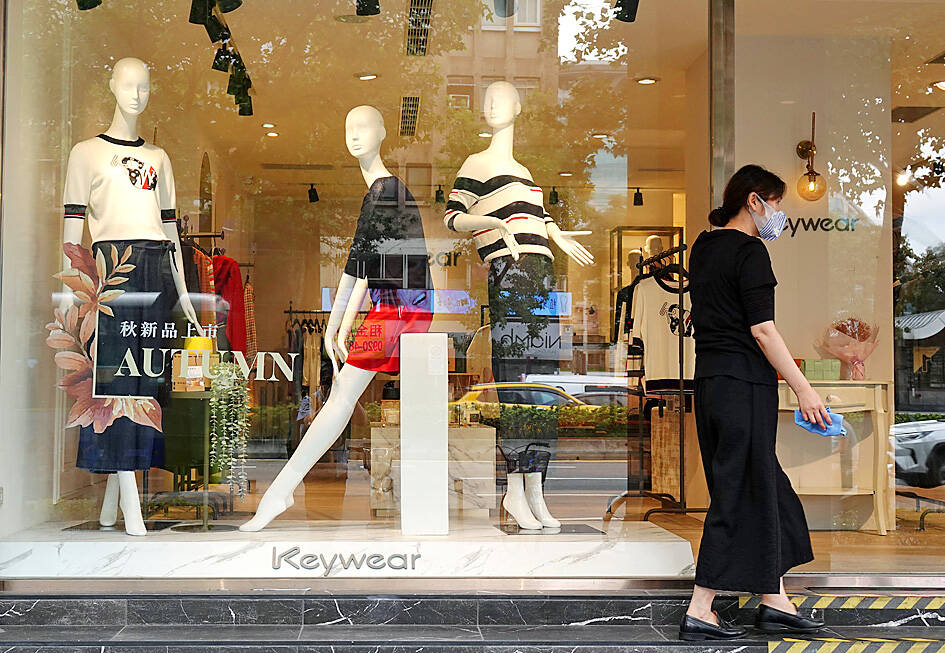The optimism level of Taiwanese businesses has dropped to a seven-quarter low, as factors such as the COVID-19 pandemic, inflationary pressure and supply chain bottlenecks have not yet fully stabilized, business data and analytical insights provider Dun & Bradstreet (D&B) said on Friday.
The business optimism index is 108.1 this quarter, a fall of 18.8 percent from the previous quarter and a decline of 10 percent from a year earlier, marking its lowest level since the first quarter of last year, the US-based firm said in a report, based on a survey conducted from early June to early July.
The index comprises six sub-indices that gauge business sentiment toward sales volume, net profit, selling prices, new orders, inventory levels and workforce size.

Photo: CNA
The latest survey found that optimism levels of Taiwanese businesses for net sales, new orders and net profit were at their lowest in seven quarters.
Compared with the second quarter, all six sub-indices fell with businesses’ optimisim levels for sales volume, selling prices and new orders, declining more than 10 percent each, the survey showed.
“This survey was conducted in the middle of 2022 when the demand for some emerging technology applications in Taiwan continued to increase, the shortage of raw materials in the supply chain was gradually improving and the price of products rose, resulting in double-digit growth in trade in the first half of this year,” D&B said in the report.
“However, as the Russia-Ukraine war is still in a stalemate, it pushes up international energy and food prices and causes global inflationary pressure to rise continuously,” it said.
“As a result, Taiwan’s overall business optimism index dropped significantly in the third quarter,” it added.
While the manufacturing sector’s optimism level dropped to 104.7 from 138.5 in the previous quarter, sentiment in the services sector fared relatively better, with optimism falling to a lesser degree, to 113.4 from 126.4, the survey showed.
Among local industries, the most optimistic were hotels, restaurants and beverage stores in terms of new orders, net profit and retail prices.
Information and communication technology firms were most upbeat regarding sales volumes and staffing, while firms in the transportation industry were more pessimistic about sales volumes, net sales, new orders and workforce size, according to the survey.

Leading Taiwanese bicycle brands Giant Manufacturing Co (巨大機械) and Merida Industry Co (美利達工業) on Sunday said that they have adopted measures to mitigate the impact of the tariff policies of US President Donald Trump’s administration. The US announced at the beginning of this month that it would impose a 20 percent tariff on imported goods made in Taiwan, effective on Thursday last week. The tariff would be added to other pre-existing most-favored-nation duties and industry-specific trade remedy levy, which would bring the overall tariff on Taiwan-made bicycles to between 25.5 percent and 31 percent. However, Giant did not seem too perturbed by the

AI SERVER DEMAND: ‘Overall industry demand continues to outpace supply and we are expanding capacity to meet it,’ the company’s chief executive officer said Hon Hai Precision Industry Co (鴻海精密) yesterday reported that net profit last quarter rose 27 percent from the same quarter last year on the back of demand for cloud services and high-performance computing products. Net profit surged to NT$44.36 billion (US$1.48 billion) from NT$35.04 billion a year earlier. On a quarterly basis, net profit grew 5 percent from NT$42.1 billion. Earnings per share expanded to NT$3.19 from NT$2.53 a year earlier and NT$3.03 in the first quarter. However, a sharp appreciation of the New Taiwan dollar since early May has weighed on the company’s performance, Hon Hai chief financial officer David Huang (黃德才)

NVIDIA FACTOR: Shipments of AI servers powered by GB300 chips would undergo pilot runs this quarter, with small shipments possibly starting next quarter, it said Quanta Computer Inc (廣達), which supplies artificial intelligence (AI) servers powered by Nvidia Corp chips, yesterday said that AI servers are on track to account for 70 percent of its total server revenue this year, thanks to improved yield rates and a better learning curve for Nvidia’s GB300 chip-based servers. AI servers accounted for more than 60 percent of its total server revenue in the first half of this year, Quanta chief financial officer Elton Yang (楊俊烈) told an online conference. The company’s latest production learning curve of the AI servers powered by Nvidia’s GB200 chips has improved after overcoming key component

UNPRECEDENTED DEAL: The arrangement which also includes AMD risks invalidating the national security rationale for US export controls, an expert said Nvidia Corp and Advanced Micro Devices Inc (AMD) have agreed to pay 15 percent of their revenue from Chinese artificial intelligence (AI) chip sales to the US government in a deal to secure export licenses, an unusual arrangement that might unnerve both US companies and Beijing. Nvidia plans to share 15 percent of the revenue from sales of its H20 AI accelerator in China, a person familiar with the matter said. AMD is to deliver the same share from MI308 revenue, the person added, asking for anonymity to discuss internal deliberations. The arrangement reflects US President Donald Trump’s consistent effort to engineer